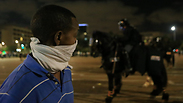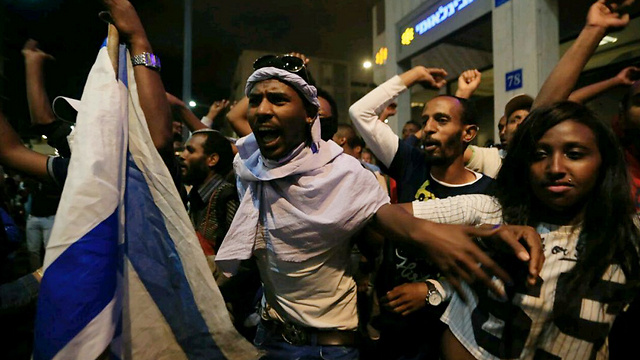
The Ethiopian Israelis' justified outcry
Op-ed: Xenophobia is not only rooted in Israel – it is also encouraged by politicians on the eve of elections. The young protestors are forcing Israelis to look in the mirror, and it's not a pretty sight.
The Israeli society is infected with racism. Racism is far more common and far more poisonous than we dare tell ourselves. It doesn’t start with Ethiopian immigrants and doesn’t end with them. There is racism of skin color, whose victims are foreign workers, Israelis of Ethiopian descent and sometimes Israelis of Yemeni descent and Israeli Arabs; there is racism of nationality, of sexual inclination, of gender.
Xenophobia, or hatred towards anyone perceived to be foreign, is not only deeply rooted here – it is also encouraged by politicians on the eve of elections. The protestors are forcing the Israelis to see themselves in the mirror, and it's not a pretty sight. It's easier to talk about riots on Ibn Gvirol Street.
In the first parts of the demonstration, on the Kaplan Intersection and on the Ayalon Freeway, the protestors were joined by young non-Ethiopian men and women, who came to express their solidarity. At first there were hundreds of protestors; then several thousand.

The police treated the protestors with the maximum consideration. They wouldn't have acted the same way towards ultra-Orthodox protestors, I was told by a haredi man who found himself at the junction, and I believe he is right. There were heavy traffic jams, but the drivers accepted them. It seemed everyone felt there was something real, justified, in the young Ethiopians' outcry.
The current wave of protests was ignited by a video showing a policeman beating a soldier of Ethiopian descent. There was nothing coincidental in that incident. Young men and women from the Ethiopian community are often subjected to discriminatory treatment, sometimes even violence, by police officers and security personnel.
The new thing here was the huge influence of the social networks. This influence had no limits. The networks intensified the impression of the protests which broke out last week in Baltimore, where a young black man died after being arrested by the police. The protestors in Jerusalem and Tel Aviv borrowed the hands up in the air, as if handcuffed, and the anti-police slogans from the Americans. The violence, which was well photographed there, arrived here too. During a visit to America, I went last Thursday to a protest at Philadelphia's City Hall square, one of the biggest protests America has ever seen. There was an uncommon similarity between the images and sounds there and here.
But there was also a difference. There is no similarity between the situation of black people in the slums of the United States' big cities and the situation of young Israelis of Ethiopian descent. The institutional investment in this immigration's absorption is great, filled with feelings of guilt and good intentions. Mistakes have been made and will be made, but the racism comes from the bottom, not from the top, and it cannot be erased through budgetary decisions.
There is another truth we must deal with: The Israeli political and media culture illustrates that violence is the only way to leave an impression, to make a difference. Those who riot get something in return; those who protest quietly get a hug at the most.










